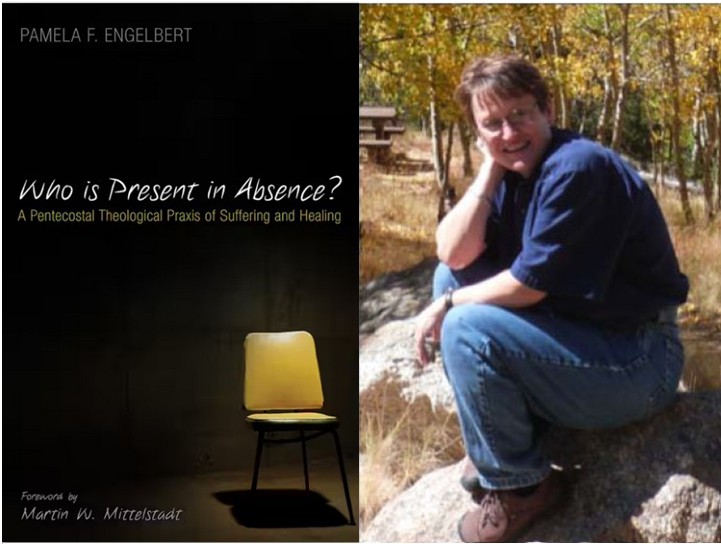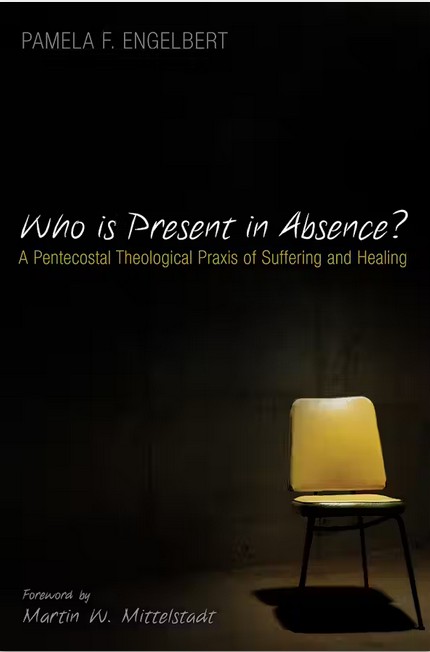Pentecostal Encounters with Suffering: an interview with Pamela F. Engelbert

From the publisher: What transpires when Classical Pentecostals pray for God to intervene amidst their suffering, but God does not? Traditionally, Classical Pentecostals center on encountering God as demonstrated through the relating of testimonies of their experiences with God. In seeking to contribute to a theology of suffering for Pentecostals, Pam Engelbert lifts up the stories of eight Classical Pentecostals to discover how they experienced God and others amidst their extended suffering even when God did not intervene as they had prayed. By valuing each story, this qualitative practical theology work embraces a Pentecostal hermeneutic of experience combined with Scripture, specifically the Gospel of John. As a Pentecostal practical theological project it offers a praxis (theology of action) of suffering and healing during times when we experience the apparent absence of God. It invites the reader to enter into the space of the other’s suffering by way of empathy, thereby participating in God’s act of ministry to humanity through God’s expression of empathy in the very person of Jesus.
Interview with Dr. Pamela F. Engelbert
What is a short synopsis of the book?

Pamela F. Engelbert, Who is Present in Absence?: A Pentecostal Theological Praxis of Suffering and Healing (Pickwick Publications, 2019)
There are two themes that define this book: stories and encounters with God. This book is about real pentecostals who suffered and how they experienced God and others in the midst of their suffering. It tells the stories of how God did not intervene when people had prayed. It, then, looks at those stories through the lens of Scripture and psychology to form a fuller theological understanding of suffering and healing.
What type of book is it?
This is a practical theology book, which is not simply applied theology. I believe that practical theology asserts that acts of ministry reveal theology. This means, we know God by God’s acts of ministry to humanity, which is to say, we know God is love because God ministered to humanity by giving the Son. This practical theological book specifically focuses on how the body of Christ reflects God’s love through the congregational care they offer to each other.
Why did you write this book?
God is present in the midst of suffering, and we participate in the ministry of presence by being present with others in their suffering.
For whom is the book intended?
This book is geared for those who are pursuing higher education, particularly a master’s degree or a PhD. It is also for those in the academy who are challenging pentecostals to strengthen their theology of suffering; this is a response to that call. Yet, it is also for the caregiver who seeks to help others who are suffering and for the carereceiver who wonders, “Where are you God?” Finally, and maybe most importantly, it is for the pentecostal, who has a tendency to speak a triumphal message that presents itself as power over rather than power with the sufferer.
What about those who are not in the academy? Will this book be helpful to them?
I believe so. The book centers on stories of people, and I believe that as humans, we all relate to stories. I want to acknowledge that for some who are not in the academy that the first chapter may not capture their interest. If this is the case, I would recommend that they persevere through it, gleaning what they can, and then delve more deeply into the remainder of the book.
What do you hope people will take away from this book?
God is present in the midst of suffering, and we participate in the ministry of presence by being present with others in their suffering. I think pentecostals have a unique opportunity to minister in this regard because we know the strength and peace that we receive when we experience God. Pentecostals tell me about the love and comfort they feel when they encounter God’s presence even though their situation may not have changed. This book is an invitation to practice that presence with those who are suffering, so sufferers may experience the strength, love, and comfort of God as we are present to them in their suffering. Since God is already present to sufferers even though they may be experiencing God’s apparent absence, we participate in God’s ministry of presence through the power of the Spirit, thereby allowing sufferers to experience God as we are present to them.
Where can we learn more about your books?
I have created videos that introduce the content of Who Is Present in Absence? and See My Body, See Me. Two of the videos may be viewed at:
https://wipfandstock.com/author/pamela-f-engelbert/
Three videos about the books may be viewed at:
https://www.youtube.com/@PamEngelbert-w6m
PR
Category: Ministry, Summer 2025


